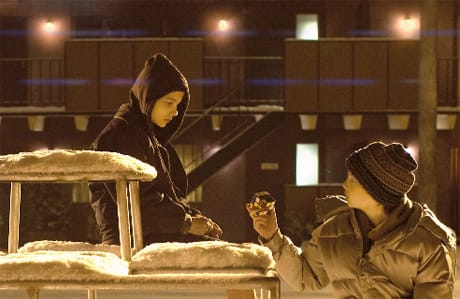Foreign horror films are dutifully Americanized like clockwork, but seldom does public trepidation boil over as quickly as with Matt Reeves' remake of Let the Right One In, likely because that film was an undisputed masterpiece and Reeves' resume features only Cloverfield, a far better trailer than film.
Despite its woefully dumbed down title, Let Me In doesn't suck. In fact, it retains much of the original's emotional impact without over-referencing it visually. Most of Reeves's fingerprints are aesthetic; the story is relatively un-tampered with, aside from a minor structural shift.
A badly burnt man is taken to a hospital where a cop grills him about being a Satanist or cultist. Those who've seen the Swedish version mostly know what happens next, and right after an important bit of action, "two weeks earlier" flashes on screen and the movie properly starts.
It's either the studio trying to "liven up" the first act of a deliberately paced story or Reeves trying to distance his take without being particularly inventive about it. Whatever the case, the structural shift unnecessarily off-balances the focus on Owen and Abby's burgeoning relationship, and that's where Let Me In stands shoulder to shoulder with its predecessor.
Chloe Moretz (as eternally 12-year-old vampire Abby) and Kodi Smit-McPhee (as the bullied, neglected Owen) are the most capable actors of their young age group. Moretz, in particular, possesses the cold confidence and magnetic presence needed to project the strength and wisdom of her character with few physical displays. The bullying scenes are still uncomfortably menacing, and the abusive relationship between Abby and her guardian, played by Richard Jenkins, as an utterly defeated and devoted man drained of all his will, is more pronounced.
For a film that displays a lot of visual panache, it's a shame Reeves couldn't come up with a way to compete with the elegant genius of Let the Right One In director Tomas Alfredson's pool climax. Instead of admitting defeat by paying direct tribute, he settles for an inferior version of the scene.
Unnecessary as it may be, Let Me In is a solid, if occasionally softened, retelling of a tale that transcends genre with its rare moral weight.
(Overture)Despite its woefully dumbed down title, Let Me In doesn't suck. In fact, it retains much of the original's emotional impact without over-referencing it visually. Most of Reeves's fingerprints are aesthetic; the story is relatively un-tampered with, aside from a minor structural shift.
A badly burnt man is taken to a hospital where a cop grills him about being a Satanist or cultist. Those who've seen the Swedish version mostly know what happens next, and right after an important bit of action, "two weeks earlier" flashes on screen and the movie properly starts.
It's either the studio trying to "liven up" the first act of a deliberately paced story or Reeves trying to distance his take without being particularly inventive about it. Whatever the case, the structural shift unnecessarily off-balances the focus on Owen and Abby's burgeoning relationship, and that's where Let Me In stands shoulder to shoulder with its predecessor.
Chloe Moretz (as eternally 12-year-old vampire Abby) and Kodi Smit-McPhee (as the bullied, neglected Owen) are the most capable actors of their young age group. Moretz, in particular, possesses the cold confidence and magnetic presence needed to project the strength and wisdom of her character with few physical displays. The bullying scenes are still uncomfortably menacing, and the abusive relationship between Abby and her guardian, played by Richard Jenkins, as an utterly defeated and devoted man drained of all his will, is more pronounced.
For a film that displays a lot of visual panache, it's a shame Reeves couldn't come up with a way to compete with the elegant genius of Let the Right One In director Tomas Alfredson's pool climax. Instead of admitting defeat by paying direct tribute, he settles for an inferior version of the scene.
Unnecessary as it may be, Let Me In is a solid, if occasionally softened, retelling of a tale that transcends genre with its rare moral weight.
